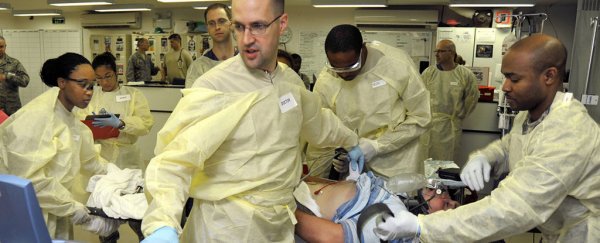The levels of a protein called troponin in your blood could tell doctors whether you're at risk of a heart attack, thanks to a new high-sensitivity blood test developed by researchers in the UK.
This quick, convenient method of testing patients could rule out the diagnosis of a heart attack for two-thirds of people in hospital emergency departments, researchers say, drastically simplifying the costs and procedures of hospital admissions for acute chest pain.
"Until now there were no quick ways to rule out a heart attack within the emergency department," said lead author Anoop Shah from the University of Edinburgh. "We have identified a cardiac troponin concentration (less than 5 nanograms per decilitre; <5 ng/L) below which patients are at very low risk of heart attack either during the admission or in the ensuing 30 days."
In the UK, hospital visits for chest pain stand at around 1 million every year, with guidelines requiring extensive monitoring of any patients who might experience a heart attack. This can take place in long visits to the emergency department, or some patients may be admitted to hospital and receive a bed in a ward.
The majority of those patients, however, never actually end up having a heart attack. Now thanks to this blood test, which can detect far lower levels of troponin in the blood than previous, less-precise tests could register, these patients could be sent home straight away.
The researchers trialled the system on 6,000 patients in hospitals in Scotland and the US and identified that almost two-thirds of patients (61 percent) could have been eligible for a safe early discharge, having presented less than 5 ng/L of troponin in their blood results.
"These patients are therefore potentially suitable for immediate and safe discharge from the emergency department," said Shah. "These findings could dramatically reduce unnecessary hospital admissions and provide substantial cost savings for healthcare providers."
Those with a higher level of troponin above 5 ng/L won't be so lucky, however. Not only would they have to stay in hospital for ongoing monitoring and tests, but research shows that they're also three times more likely to have a heart attack than patients with lower troponin levels.
While the study is promising, other physicians are cautious of the risks that could come with instant discharges of potentially ill patients on the outcome of a singular blood test, arguing that further research is required before this process can be safely adopted.
"The ultimate validation for the safety and efficacy of discharging patients … will be the report of clinical outcomes after this threshold is implemented in routine clinical practice," writes a team of physicians from emergency departments in Australia and New Zealand, in a commentary on the study.
"[W]hat further assessment, if any, is needed for those patients identified as low risk and suitable for early discharge? Trials are needed to assess the safety and effectiveness of clinical pathways that involve no further testing for such patients."
The research is published in The Lancet.
